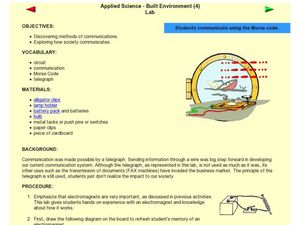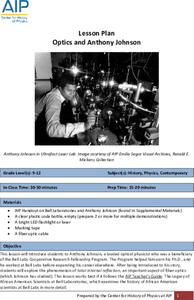PBS
The Lowdown — Examining California's Prison System: Real-World Ratio
Free yourself from the shackles of traditional math lessons. Young mathematicians investigate race, gender, and age differences in California's prison system. They use provided graphics to compare the prison population with the state's...
Curated OER
Chinese Philosophies & Ethical Codes
Focusing primarily on Confucianism, these slides contrast the philosophies of India with those of China - and introduce the philosophies of Legalism and Daoism as well. Your world history lecture will come alive with the clear outlines...
Curated OER
Zip Codes
Young scholars discover how a zip code is used. In this zip code lesson, students use the parts of a zip code to find where a letter is going, then find the first number of zip codes based on geographic regions.
Council for the Curriculum, Examinations and Assessment
Morals, Values, and Beliefs
OK, or not OK? As part of a study of morals, values, and beliefs, class members engage in a series of activities that help them identify their own moral code.
Curated OER
Cracking Codes and Ciphers
Students explore different codes and ciphers including Morse Code, Egyptian Hieroglyphs, and the Alphabet. They discuss how and why codes are used. Students create their own code and message to exchange with classmates.
Curated OER
Morse Code, Telegraph, and West Virginia
Young scholars prepare for a visit to the West Virginia State Museum. In this West Virginia history lesson, students research the Morse Code and telegraph. Young scholars create their own Morse Code and discuss communication history...
Curated OER
Challenges to the Concert System
A panoramic view of the European revolutions of the 19th century ties these slides together, which feature paintings and maps to illustrate the effects of each revolution. Details and information about the Greek, Belgian, French, and...
Curated OER
Cracking the Code
Students explore encoding systems and decoding technology. In this barcoding lesson plan students examine how coding impacts society including distribution, and inventory.
Curated OER
Communication Methods
Young scholars explore communications by participating in a science class activity. In this communication technology lesson, students discuss the process of morse code, its history, and the electromagnets used to create the device. Young...
Curated OER
Breaking the Code
Students understand what cryptography is and how to design original number-based codes. In this cryptography lesson, students research codes during World War II. Students develop number-based codes.
Curated OER
Ocean Morse Code
Students gain knowledge of the maritime importance of Morse code and enjoy applying this information to decipher Morse code messages from other students.
Curated OER
The O Zone-Code Read Alert
What are the effects of an air quality alert? Expert groups receive one component of air quality information resources to study. Pupils then jigsaw into new groups and share their knowledge. Finally, they draft a statement of what they...
Curated OER
Does My Hair Disrupt Your Learning
Pupils research the laws and policies for school dress codes in their school and others in their state or area and explore what others say about these policies. After research is complete, students divide into two teams to develop...
American Institute of Physics
Optics and Anthony Johnson
Message sending has come a long way since the days of Morse code's dots and dashes. Young scientists study the research of optical physicist Anthony Johnson and his work in fiber optics, lasers, and the principle of total internal...
Curated OER
Sworn to Serve
Seventh graders explore the structure of the feudal system. In this world history instructional activity, 7th graders examine medieval history as they collaborate to prepare for a small group presentations regarding the feudal system.
Curated OER
Rules and Laws
Students investigate the difference between rules and laws. In this justice system lesson, students discuss the presence of rules of their lives and compare them the "Code of the West."
BBC
Crime
Crime and punishment! Learners discuss the law, civics, and crime in the UK. They brainstorm lists of crimes and possible punishments, complete activities on a website, role-play a Juvenile Court scenario, and try to think of ways they...
Curated OER
Navajo Code Talkers of WWII
Eighth graders assess different ways that significant individuals and events influenced economic, social and political systems in the United States after 1880. They experience a Navajo code talker's dictionary to create and decode messages.
Curated OER
Underground Rails: The New York City Subway System
Students explore the New York Subway system. They investigate its usefulness as mode of transportation for the people in the city and study its history compared to other city subway systems. They examine how the subway connects the...
Curated OER
And Justice For All
Students compare three justice systems currently in place in the United States: the civilian criminal justice system, the military criminal justice system (courts-martial) and the secret wartime tribunals that President Bush has proposed...
Curated OER
The United States Flag
Students discover the meaning and symbolism behind the American flag. In this instructional activity on National symbols, students design a flag for their school, explain the symbolism they used, and distinguish the elements that...
Curated OER
The Five W's of Tax Day
Use April 15th to teach your students the fundamentals of the American federal tax system.
Curated OER
History and Analysis of Cryptography
Young scholars are introduced to the code systems and art of cryptography. As a class, they review prior knowledge and brainstorm lists. Using the internet, they research the history of codes and determine how they are structured. ...
Council for Economic Education
Tax Time Scavenger Hunt
Is a 1040EZ tax form really easy? Scholars investigate the complexities of the United States taxation system with an economics instructional activity. Using a wide variety of web sources, they interpret IRS taxation rules and regulations...























